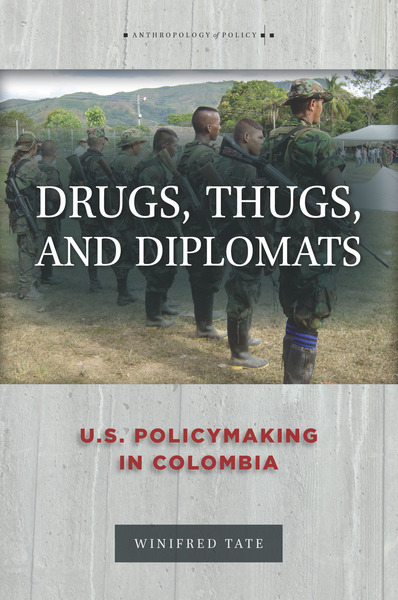
2015
304 pages.
from $30.00
Hardcover ISBN: 9780804792011
Paperback ISBN: 9780804795661
Ebook ISBN: 9780804795678
In 2000, the U.S. passed a major aid package that was going to help Colombia do it all: cut drug trafficking, defeat leftist guerrillas, support peace, and build democracy. More than 80% of the assistance, however, was military aid, at a time when the Colombian security forces were linked to abusive, drug-trafficking paramilitary forces. Drugs, Thugs, and Diplomats examines the U.S. policymaking process in the design, implementation, and consequences of Plan Colombia, as the aid package came to be known.
Winifred Tate explores the rhetoric and practice of foreign policy by the U.S. State Department, the Pentagon, Congress, and the U.S. military Southern Command. Tate's ethnography uncovers how policymakers' utopian visions and emotional entanglements play a profound role in their efforts to orchestrate and impose social transformation abroad. She argues that U.S. officials' zero tolerance for illegal drugs provided the ideological architecture for the subsequent militarization of domestic drug policy abroad. The U.S. also ignored Colombian state complicity with paramilitary brutality, presenting them as evidence of an absent state and the authentic expression of a frustrated middle class. For rural residents of Colombia living under paramilitary dominion, these denials circulated as a form of state terror. Tate's analysis examines how oppositional activists and the policy's targets—civilians and local state officials in southern Colombia—attempted to shape aid design and delivery, revealing the process and effects of human rights policymaking.
About the author
Winifred Tate is Assistant Professor of Anthropology at Colby College and author of Counting the Dead: The Culture and Politics of Human Rights Activism in Colombia (2007).
"Here's the book we've been waiting for to help us make sense of the much debated Plan Colombia, from the national security bureaucracy in Washington to the coca fields in Colombia. Tate's fascinating account is a model for how to do an ethnography of foreign policymaking."
—Peter Andreas, Brown University
"Tate's book sets a new standard for the anthropological study of policymaking. A master ethnographer with deep experience, she tells the chilling story of how the militarization of U.S. drug policy, the mobilization of fear, the limitations of human rights lobbying, and the outsourcing of Colombian security to paramilitary forces all came together to produce a 'model aid plan' that, for most Colombians, was anything but. A tour de force of political acuity."
—Susan Greenhalgh, Harvard University
"Drugs, Thugs, and Diplomats is a rich and insightful analysis of the cultural dimensions of policy making, focusing on Plan Colombia, the massive US program of military and economic aid to Colombia. This book makes a major contribution to the exciting new field of the anthropology of policy."
—Sally Engle Merry, New York University
"Winifred Tate's Drugs, Thugs, and Diplomats: U.S. Policymaking in Colombia makes an interesting contribution not only to the field of the anthropology of policy but also to the understanding of Plan Colombia, one of the backbones of U.S. strategy in its War on Drugs in Latin America."
—Alejandro Castillejo-Cuéllar, American Anthropologist
"Winifred Tate's Drugs, Thugs, and Diplomats stands out among books on this topic for its methodological and theoretical rigor and its insightful arguments. This book is a powerful ethnography of foreign policymaking, focusing on Plan Colombia, the multibillion-dollar counternarcotics and counterinsurgency plan launched in 2000, to which the United States contributed more than $8 billion from 2000 to 2012 and which is now presented in policy circles as an example of a successful antinarcotics and antiterrorism policy. The book is more than an analysis of the genesis, implementation, and impact of Plan Colombia; it distills the complexities and negative consequences behind the plan's touted success. Tate analyzes policymaking as a field that entails contradictory objectives, bureaucratic politics, and multiple actors inside and outside government institutions. Galvanizing her experience as a policy advocate, her extensive research in Colombia, and her skill in poignant analysis, she unveils how policy implementation depends on legitimizing discourses, alliances, the creation of "acceptable" expertise, and the mobilization of emotional attachments. She highlights the importance of understanding policymaking and policymakers not as rational, linear processes and actors but as evolving fields."
—Angélica Durán-Martínez, Latin American Politics and Society